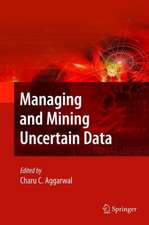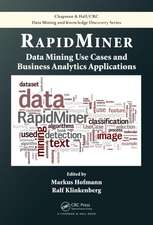Social Computing, Behavioral Modeling, and Prediction
Editat de Huan Liu, John Salerno, Michael J. Youngen Limba Engleză Hardback – 12 mar 2008
| Toate formatele și edițiile | Preț | Express |
|---|---|---|
| Paperback (1) | 986.34 lei 43-57 zile | |
| Springer Us – 4 noi 2010 | 986.34 lei 43-57 zile | |
| Hardback (1) | 993.28 lei 43-57 zile | |
| Springer Us – 12 mar 2008 | 993.28 lei 43-57 zile |
Preț: 993.28 lei
Preț vechi: 1241.59 lei
-20% Nou
Puncte Express: 1490
Preț estimativ în valută:
190.12€ • 206.59$ • 159.81£
190.12€ • 206.59$ • 159.81£
Carte tipărită la comandă
Livrare economică 21 aprilie-05 mai
Preluare comenzi: 021 569.72.76
Specificații
ISBN-13: 9780387776712
ISBN-10: 0387776710
Pagini: 264
Ilustrații: XVIII, 264 p.
Dimensiuni: 155 x 235 x 20 mm
Greutate: 0.59 kg
Ediția:2008
Editura: Springer Us
Colecția Springer
Locul publicării:New York, NY, United States
ISBN-10: 0387776710
Pagini: 264
Ilustrații: XVIII, 264 p.
Dimensiuni: 155 x 235 x 20 mm
Greutate: 0.59 kg
Ediția:2008
Editura: Springer Us
Colecția Springer
Locul publicării:New York, NY, United States
Public țintă
ResearchCuprins
Rational Choice Theory: A Forum for Exchange of Ideas between the Hard and Social Sciences in Predictive Behavioral Modeling.- The SOMA Terror Organization Portal (STOP): social network and analytic tools for the real-time analysis of terror groups.- The Sociology of Alien Rule.- The DoD Encounters the Blogosphere.- Integrating Multi-Agent Technology with Cognitive Modeling to Develop an Insurgency Information Framework (IIF).- Stochastic Opponent Modeling Agents: A Case Study with Hezbollah.- An approach to modeling group behaviors and beliefs in conflict situations.- Computational Models of Multi-National Organizations.- Clustering of Trajectory Data obtained from Soccer Game Records – A First Step to Behavioral Modeling –.- Mobile Phone Data for Inferring Social Network Structure.- Human Behavioral Modeling Using Fuzzy and Dempster–Shafer Theory.- Online Behavioral Analysis and Modeling Methodology (OBAMM).- Mining for Social Processes in Intelligence Data Streams.- An Ant Colony Optimization Approach to Expert Identification in Social Networks.- Attribution-based Anomaly Detection: Trustworthiness in an Online Community.- Particle Swarm Social Model for Group Social Learning in Adaptive Environment.- Social Network Analysis: Tasks and Tools.- Behavioral Entropy of a Cellular Phone User.- Community Detection in a Large Real-World Social Network.- Where are the slums? New approaches to urban regeneration.- A Composable Discrete-Time Cellular Automaton Formalism.- Designing Group Annotations and Process Visualizations for Role-Based Collaboration.- Modeling Malaysian Public Opinion by Mining the Malaysian Blogosphere.- Reading Between the Lines: Human-centred Classification of Communication Patterns and Intentions.- Metagame Strategies of Nation-States, withApplication to Cross-Strait Relations.- Automating Frame Analysis.- Using Topic Analysis to Compute Identity Group Attributes.
Textul de pe ultima copertă
Social computing concerns the study of social behavior and context based on computational systems. Behavioral modeling reproduces the social behavior, and allows for experimenting, scenario planning, and deep understanding of behavior, patterns, and potential outcomes. The pervasive use of computer and Internet technologies creates an unprecedented environment where people can share opinions and experiences, exchange ideas, offer suggestions and advice, debate and even conduct experiments. Social computing facilitates behavioral modeling in model building, analysis, pattern mining, anticipation, and prediction.
This unique volume presents material from the first interdisciplinary workshop focused on employing social computing for behavioral modeling and prediction. The book provides a platform for disseminating results and developing new concepts and methodologies aimed at advancing and deepening our understanding of social and behavioral computing to aid critical decision making. The contributions incorporate views from government, industry and academia and they address research problems arising from pressing demands in the real world.
Researchers, practitioners and graduate students from sociology, behavioral and computer science, psychology, cultural study, information systems, and operations research are certain to find this a fascinating and essential resource.
This unique volume presents material from the first interdisciplinary workshop focused on employing social computing for behavioral modeling and prediction. The book provides a platform for disseminating results and developing new concepts and methodologies aimed at advancing and deepening our understanding of social and behavioral computing to aid critical decision making. The contributions incorporate views from government, industry and academia and they address research problems arising from pressing demands in the real world.
Researchers, practitioners and graduate students from sociology, behavioral and computer science, psychology, cultural study, information systems, and operations research are certain to find this a fascinating and essential resource.
Caracteristici
Presents material from a unique workshop focused on employing social computing for behavioral modeling and prediction Integrates an interdisciplinary audience and welcomes researchers, practitioners, and graduate students from social science, behavioral science, computer science, psychology, cultural study, information systems, and operations research Incorporates views from government, industry, and academia Includes supplementary material: sn.pub/extras



























